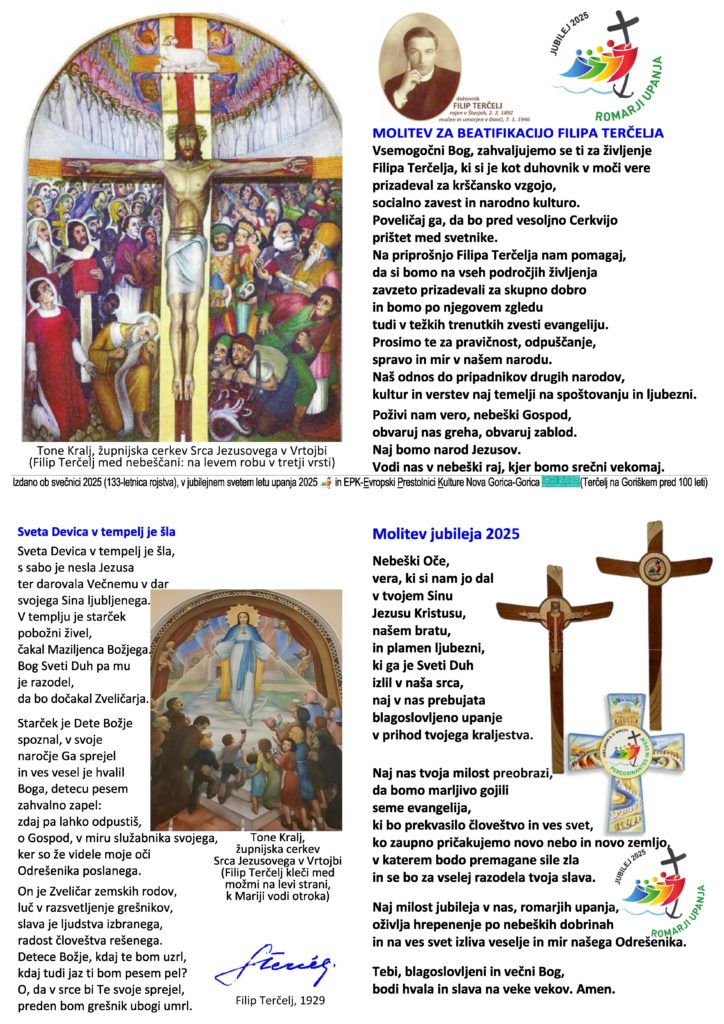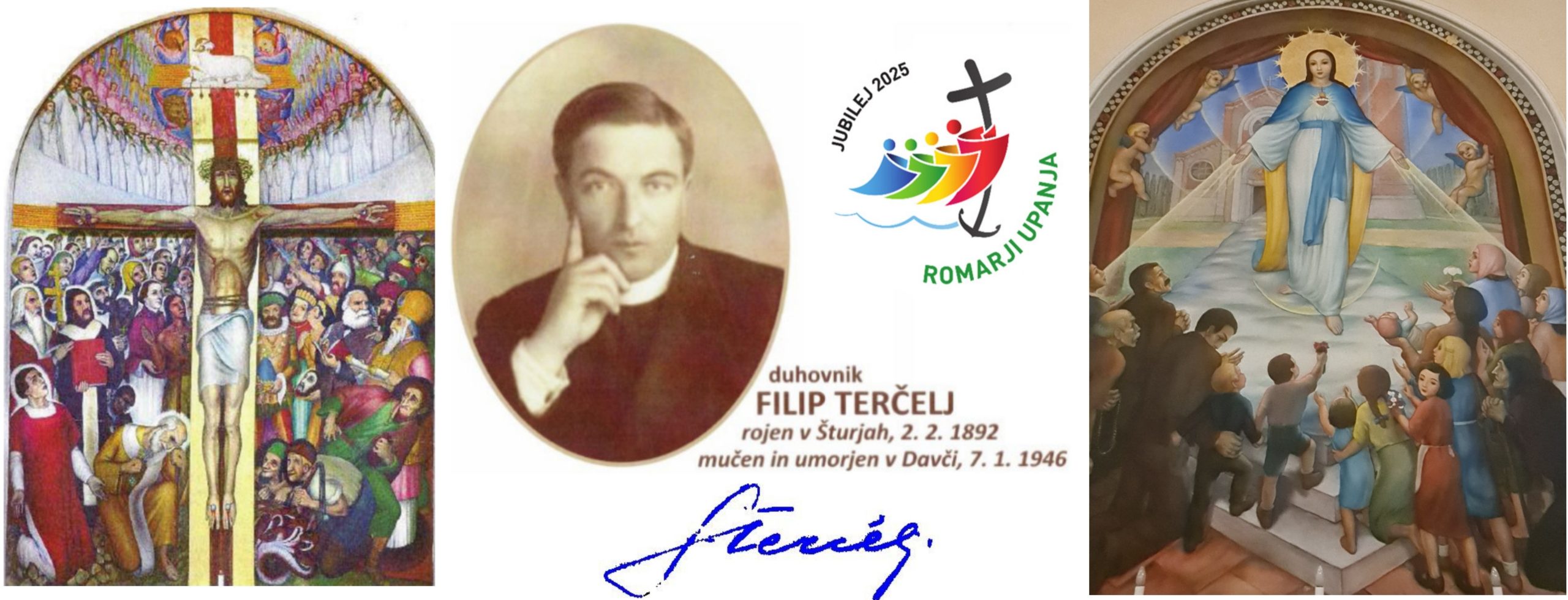Filip Terčelj, priest, educator, organizer, writer
- born on February 2, 1892 in Grivče-Šturje-Ajdovščina in the Vipava region to farmer Filip (Lipet) and Marija Rustja from Skrilje
- shot on January 7, 1946 in the forest below Davča
- elementary school in your hometown
- He attended the Diocesan Classical Gymnasium in Šentvid nad Lj. (1905–13), then the Ljubljana Theological Seminary.
- consecrated on January 8, 1917 – sang a new mass in Ljubljana because he had a seriously ill mother at home
- first chaplaincy service in Škofja Loka (1917–21)
- His superiors advised him to continue his studies – he studied in Cologne at the Faculty of Social and Pedagogical Sciences and achieved the title of Professor of Theology.
- He attended study courses in Munich-Gladbach, where he studied methods of educational work at the Kolping public education institutions and became familiar with newer ideological trends.
- He came to Goriška in 1922 as a willing educational organizer, religious teacher, and leader of student youth.
- He became a spiritual leader and catechist in Alojzijevišče, Gorizia.
- He became famous as a speaker, so that many people came to his meetings and sermons, even from more distant places.
- He systematically organized educational work in the Goriška region, so that the Educational Association, which he helped to establish in 1922 and was its secretary, had 162 educational societies included in 1925.
- Terčelj published and mostly wrote the monthly magazine Naš čolnič (Our Boat) for educational societies (1922–28)
- from 1924-29 he was a member of the narrow literary section of the Goriška Mohorjeva družba
- In 1927, he published the book Behind the Home Hearth at the Goriška Mohorjeva družba – the starting point is the idea that a nation must rely primarily on the family for its national and religious existence.
- In order for the youngest to learn to read, write and pray, in 1930, the same Goriška Mohorjeva družba published the book Mati uči otroka moliti (Mother Teaches a Child to Pray), in which he explains religious truths with short stories, questions and illustrations.
- By presenting religious truths in this way, he took a modern and attractive path and was ahead of his time.
- The second part of the book contains preparation for receiving the holy sacraments and the most important prayers.
- He collaborated with Jožek Bratuž and Vinko Vodopivec in the preparation and publication of Mohor’s church hymnals – Terčelj wrote liturgical introductions and numerous lyrics to the compositions (in Božji spevi (1929) there are 48, in Gospodovem dnevu (1930) there are 41, in Zdrava Mariji (1933) there are 25)
- He also helped with the folk hymnal Svete pesmice, which was published in 1932 with reprints in 1940 and 1955.
- For the 25th anniversary of the episcopal ordination of Archbishop Sedeja of Gorizia, he prepared a brochure in 1931, Our Overshepherd for the Silver Jubilee.
- In a discussion on the nation and the Church in the Social Reader, edited by Janko Kralj in 1926, Terčelj writes about the manifestos of Leo XIII and Marx, documents on the Christian and materialist views on society.
- The Goriška Mohorjeva družba published under the pseudonym Grivški a collection of short stories Ogorki (1935) and a story Vozniki (1940) about the life of people in the Vipava Valley in the semi-past era, which Ferdinand Kolednik translated into French (1953 in a book – three book editions and twice as a slipcase, in German, Munich 1971, and in Croatian).
- While he was the house priest of the Ljubljana mental hospital (1934–45), he wrote a chronicle in the form of a story about his hometown, which he was unable to publish due to the war situation.
- His writings, which contain insights and observations about people in mental hospitals, also remain in manuscript.
- On the pages of the Goriška Mohorjeva družba calendars, we find Terčel’s articles, sketches and poems.
- On September 6, 1931, on the first anniversary of the execution of the Bazovice heroes, Slovenian flags fluttered in the Brda:
- they imprisoned many people: on December 30th they imprisoned Filip Terčelj, Lojze Bratuž and a few boys from Brda
- Terčelj was accused of having contacts with the Brda Pan-Slavists, with emigrant and irredentist organizations in Yugoslavia, and of preparing an assassination attempt on the Kojšče podestát Baiardi.
- He endured torturous interrogations in the prisons of Gorizia and Koper, which left him mentally and physically broken.
- On New Year’s Eve, they ransacked his home in Šturje.
- he was confined to Campobasso in Molise – he was convicted of youth activities because the other charges proved to be unfounded
- Here he suffered so much from all kinds of deprivation, abandonment and humiliation that he thought life in prison was better.
- His letters are the expression of a spiritually and physically suffering man and are full of homesickness.
- with the help of Gorizia church circles and the mediation of Father Tacchi-Venturi, he was released
- but he did not get a job in the Slovenian part of the diocese:
- He was offered a position on Italian territory, especially in Venice, but he declined.
- he didn’t want to leave his people in trouble
- Even when the Ajdov parish priest Josip Fon, who had fallen ill due to intimidation and threats, asked him to replace him, the prefecture forbade him, just as it had forbidden him from any pastoral work in the Ajdovščina area.
- The Gorizia administrator, Msgr. Sirotti, suggested that he apply for a passport and emigrate to Yugoslavia – he did not want to do that either.
- In February 1934, the Archdiocese of Gorizia proposed it for Borjana, but this time too the prefecture resisted.
- He lived in constant fear at his father’s home and had to hide from the fascists several times: in Fužine near Hubelj, in Ajdovščina, and in Cola.
- One of his sermons was interpreted by regime supporters as an attack on the prefect and the Capuchins of Holy Cross.
- a new arrest was decided: Terčelj was informed in time that he could, albeit with a heavy heart, retreat to Yugoslavia
- In Ljubljana, he had to overcome many difficulties before he could force himself to arrange his life:
- He became a catechist at the Poljana Gymnasium and a professor of German.
- He lived on Poljanski nasip in the former Šentpetr barracks, which was converted into a mental hospital – there was a house priest here
- He also appeared at rallies and camps, drawing attention to the situation of the Slovenians of the Littoral region.
- He wasn’t doing well – he felt alien and superfluous
- He was deeply affected when he was imprisoned from July to September 1945 after the war – what fascism did not destroy him morally and physically, it was his fellow Slovenes for whom he worked and lived.
- When he was released from prison, he was left homeless and his modest belongings were put in the attic of the St. Joseph’s Institute.
- For the Christmas holidays of 1945, he went to his friend Franc Krašna, the parish priest in Sorica, and he also looked after Davča.
- Around December 21, 1945, some farmers were evicted there, claiming that their surnames were of German origin (Gartner, Gaser, Šmid, etc.).
- Pastor Krašna announced in the church that he would go to Ljubljana immediately after the holidays and intercede with friends to have the emigrant farmers return.
- Because the homes of the evacuees were looted, it was embarrassing for those who appropriated the belongings.
- When Krašna and Terčelj were walking on foot towards Železniki on January 7, 1946, from where a bus was taking them to Ljubljana, they were intercepted in the forest below Sorica by two SUVs belonging to members of the Communist Party.
- taken in the opposite direction, towards Podbrdo, and in Štulcova ravine below Davča they were handed over to members of the KNOJ (National Defense Corps of Yugoslavia) who were stationed on the border; they shot and buried them.
- Over time, they found a breviary in the forest, evidence of a grave, although they officially said they had fled to Zone B.
- When the OLO Kranj order came in 1947 to exhume all unidentified bodies, the people of Davča, who had known about the graves all along, dug them both up in the cemetery in Davča.
- The 1947 Davča Parish Death Register records: “Prof. Filip Terčelj, born 2.2.1892, died 7.1.1946, treacherously attacked and killed. Buried by parish priest Ivan Skvarča.”
- Both have graves in the cemetery in Davča with all the information, and under the bell tower of the parish church in Davča there is an inscription on a marble slab: “Here rest the pastor Krašna, born … and prof. Filip Terčelj, born …”, with the caption: “Both treacherously murdered.”
Source: Primorski Slovene Biographical Lexicon, https://www.slovenska-biografija.si/oseba/sbi692717/
More: https://sites.google.com/view/filip-tercelj
Prayer for the glorification of the Servant of God, Martyr Filip Terčelj
Almighty God, we thank you for the life of Filip Terčelj,
who as a priest, in the power of faith, strove for Christian education, social awareness and national culture. Glorify him so that he may be counted among the saints before the universal Church. Through the intercession of Filip Terčelj, help us to strive diligently for the common good in all areas of life and, following his example, to be faithful to the Gospel even in difficult moments. We ask you for justice, forgiveness, reconciliation and peace in our nation. Our relationship with members of other nations, cultures and religions is based on respect and love.
Revive our faith, heavenly Lord, protect us from sin, protect us from delusion.
May we be the people of Jesus. Lead us to the heavenly paradise, where we will be happy forever.

